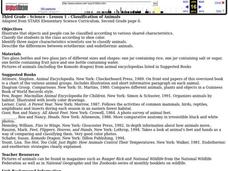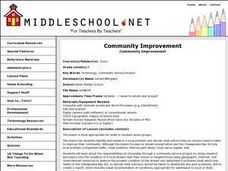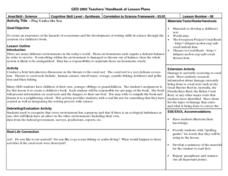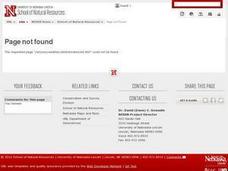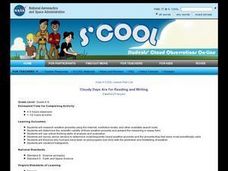Curated OER
Why Do We Need Petroleum?
Young scholars learn the many ways petroleum is used in our industrial society, and the advantages and disadvantages of its use. They explore what it would be like to live in a world without petroleum.
Curated OER
Fenwick Island, Maryland And Beyond: Who Owns the Sand?
Students examine beach processes and complex beach systems. They study the human efforts to stabilize an unstable environment can lead to complex problems.
Curated OER
Density Currents
Students study how fluids of differing densities interact with one another, how densities of fluids can be changed, and how density currents transport and deposit tremendous amounts of sediment in lakes and in the ocean.
Curated OER
Exploring For Copper Deposits
Students examine ore deposits and identify factors in their origin. They analyze geologic maps, and locate porphyry copper deposits on a sediment geochemistry map.
Curated OER
Classification of Animals
Third graders practice classiyfying items and identify three major characteristics scientists use to classify animals. They describe the differences between ectothermic and endothermic animals.
Curated OER
Rainy Day Hike
Students develop awareness about the water cycles. They identify the watershed in which their school is located. They explain the role the schoolyard plays in the watershed.
Curated OER
Fire Ecology
Fourth graders examine the role fire plays in maintaining the physical factors of the scrub ecosystem. They see that world ecosystems are shaped by physical factors that limit their productivity.
Curated OER
Mud Fossils
Learners create their own fossils in an activity using plaster of paris and a variety of objects which can be fossils, e.g. chicken bones, twigs, shells, etc. After making their fossils, they allow them to dry and discuss time and its...
Curated OER
Fish Workings
Students observe, hypothesize, and draw conclusions regarding fish. They examine their anatomy, and how they function in their environment.
Curated OER
Can You Dig It?
Students investigate a fossil site and diagram a site map. They role play as paleontologists.
Curated OER
Aquatic Communities
Students watch a video about aquatic communities. They conduct an experiment that shows how movement of rivers change the landscape. They compare fresh and salt water communities and its wildlife.
Curated OER
Community Improvement
Students examine a local body of water to determinet the health of its ecosystem and monitor it during the year. If needed they write a report on any conditions that need improvement including photographs and relevant data.
Curated OER
Play Under the Sea
Students explore the hazards of ecosystems and utilize their writing skills to create a studenT book. Threats to the ecosystem of the coral reef are discussed and used as a model for the research of the group.
Curated OER
Water Quality Issues
In this unit of lessons, students examine water quality issues. They discover ways they can conserve water and practice making drinkable water from water desalination.
Curated OER
Bioethics And Fetal Tissue Research
Pupils are introduced to the topic of fetal tissue implantation. In groups, they examine a case study and share information with the rest of the class. Then they do a reflective writing assignment to assess understanding of the ethical...
Curated OER
Global Water
Students collect data on their household water use and calculate how many gallons of water a person uses per day. They investigate how students in different parts of the world get their drinking water.
Curated OER
Am I Hot or Am I Cold?
Students practice using a thermometer to determine how the air around the earth gets heated and cooled by the sun. Students chart the daily inside and outside temperature for two weeks.
Curated OER
Soil Formation...It's a Dirty Job
High schoolers create a HyperStudio program about soil formation in their own area. They develop a list of the steps it takes to turn bedrock and organic material into soil, and create and present their HyperStudio stack to the class.
Curated OER
Researching Intermountain West Earthquakes
Students research earthquakes using the internet and newspapers. They discover the earthquake's effect on people and buildings. They report their findings to the class.
Curated OER
Ready to Erupt!
Students observe a visual representation of a volcano erupting. They measure and sketch the volcano and discuss how engineers use this information. They discover the type of equipment used to indicate an eruption.
Curated OER
Web Research Helps Students Choose Classroom Pets
Learners interview different teachers in their school. They decide which pet would fit best in each classroom. They share the information they gathered with the class.
Curated OER
Trash Count
Students identify pollution around their local community. They discuss the sources of polution and categorize objects based on their properties. They discover ways to make changes to the environment and how to inform the public.
Curated OER
What is a Cloud
Third graders study clouds and how they are formed. They write acrostic poems about clouds and analyze and graph temperature data collected during varying degrees of cloud cover.
Curated OER
Cloudy Days Are for Reading and Writing
Students consider a variety of well-known proverbs that refer to the weather. They research the scientific validity of these proverbs, conduct interviews about public perception of the proverbs and summarize their findings in writing.
Other popular searches
- Health and Fitness Surveys
- Surveys and Bar Graphs
- Surveys of Favorite Foods
- Mean Median Mode Surveys
- Designing Surveys
- Opinion Surveys
- Data Tables Surveys
- Surveys and Sampling
- Surveys and Graphs
- Interest Surveys
- Writing Surveys
- Land Surveys






